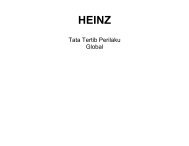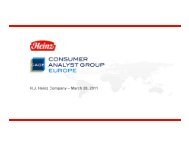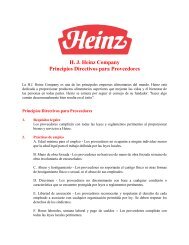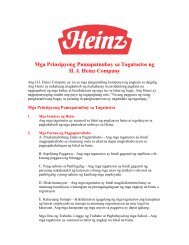Download Annual Report PDF - Heinz
Download Annual Report PDF - Heinz
Download Annual Report PDF - Heinz
You also want an ePaper? Increase the reach of your titles
YUMPU automatically turns print PDFs into web optimized ePapers that Google loves.
these effects. Accordingly, this devaluation has not and is not expected to materially impact our<br />
operating results.<br />
Highly Inflationary Economy<br />
An economy is considered highly inflationary under U.S. GAAP if the cumulative inflation rate<br />
for a three-year period meets or exceeds 100 percent. Based on the blended National Consumer Price<br />
Index, the Venezuelan economy exceeded the three-year cumulative inflation rate of 100 percent<br />
during the third quarter of Fiscal 2010. As a result, the financial statements of our Venezuelan<br />
subsidiary have been consolidated and reported under highly inflationary accounting rules<br />
beginning on January 28, 2010, the first day of our Fiscal 2010 fourth quarter. Under highly<br />
inflationary accounting, the financial statements of our Venezuelan subsidiary are remeasured<br />
into the Company’s reporting currency (U.S. dollars) and exchange gains and losses from the<br />
remeasurement of monetary assets and liabilities are reflected in current earnings, rather than<br />
accumulated other comprehensive loss on the balance sheet, until such time as the economy is no<br />
longer considered highly inflationary.<br />
The impact of applying highly inflationary accounting for Venezuela on our consolidated<br />
financial statements is dependent upon movements in the applicable exchange rates (at this<br />
time, the official rate) between the local currency and the U.S. dollar and the amount of<br />
monetary assets and liabilities included in our subsidiary’s balance sheet. At April 27, 2011, the<br />
U.S. dollar value of monetary assets, net of monetary liabilities, which would be subject to an<br />
earnings impact from exchange rate movements for our Venezuelan subsidiary under highly<br />
inflationary accounting was $67 million.<br />
Recently Issued Accounting Standards<br />
In May 2011, the Financial Accounting Standards Board (“FASB”) issued an amendment to<br />
revise the wording used to describe the requirements for measuring fair value and for disclosing<br />
information about fair value measurements. For many of the requirements, the FASB does not intend<br />
for the amendments to result in a change in the application of the current requirements. Some of the<br />
amendments clarify the FASB’s intent about the application of existing fair value measurement<br />
requirements, such as specifying that the concepts of highest and best use and valuation premise in a<br />
fair value measurement are relevant only when measuring the fair value of nonfinancial assets.<br />
Other amendments change a particular principle or requirement for measuring fair value or for<br />
disclosing information about fair value measurements such as specifying that, in the absence of a<br />
Level 1 input (refer to Note 10, “Fair Value Measurements” in Item 8—“Financial Statements and<br />
Supplementary Data” for additional information), a reporting entity should apply premiums or<br />
discounts when market participants would do so when pricing the asset or liability. The Company is<br />
required to adopt this amendment on January 26, 2012, the first day of the fourth quarter of Fiscal<br />
2012. The Company is currently evaluating the impact this amendment will have, if any, on its<br />
financial statements.<br />
In December 2010, the FASB issued an amendment to the disclosure requirements for Business<br />
Combinations. This amendment clarifies that if a public entity is required to disclose pro forma<br />
information for business combinations, the entity should disclose such pro forma information as<br />
though the business combination(s) that occurred during the current year had occurred as of the<br />
beginning of the comparable prior annual reporting period only. This amendment also expands the<br />
supplemental pro forma disclosures for business combinations to include a description of the nature<br />
and amount of material nonrecurring pro forma adjustments directly attributable to the business<br />
combination included in reported pro forma revenue and earnings. The Company is required to adopt<br />
this amendment on April 28, 2011, the first day of Fiscal 2012 for any business combinations that are<br />
material on an individual or aggregate basis.<br />
30

















